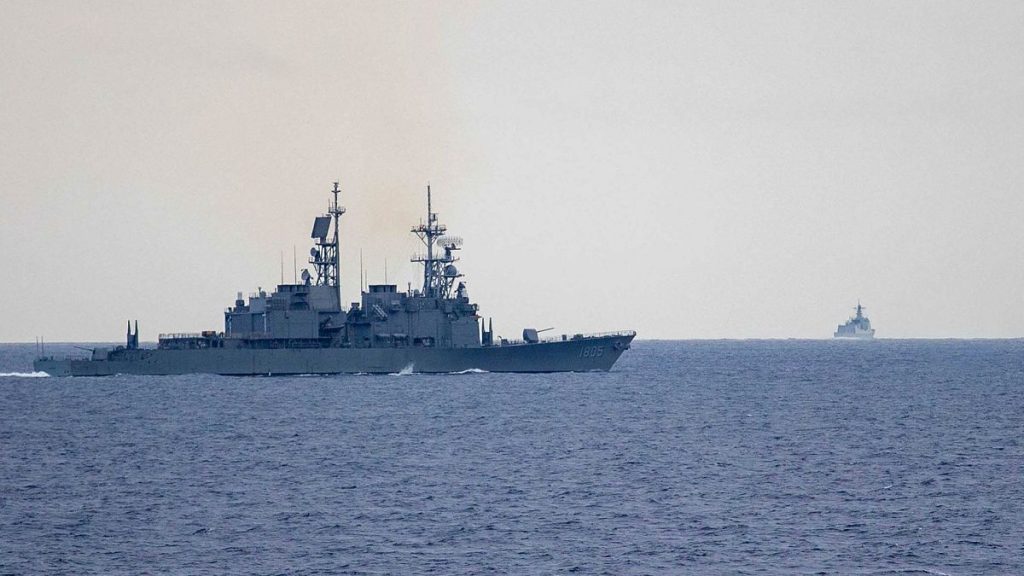Recent military exercises conducted by China near Taiwan have heightened tensions in the region, leading to strong condemnation from Taiwan’s authorities. The Taiwanese Defence Minister has characterized China as a “troublemaker,” further asserting the importance of regional peace. Amidst increasing military activities including the entry of multiple Chinese drones and naval ships into Taiwan’s air defense zone, Taiwan is reportedly enhancing its defense measures, prompting concerns over potential escalations in conflict.
| Article Subheadings |
|---|
| 1) Overview of Recent Chinese Military Activities |
| 2) Taiwan’s Response to Increased Provocations |
| 3) International Reactions and Diplomatic Implications |
| 4) The Strategic Importance of the Taiwan Strait |
| 5) Taiwan’s Military Enhancements and Future Outlook |
Overview of Recent Chinese Military Activities
The escalation of military drills by China around Taiwan has emerged as a significant concern for the Taiwanese government. The Taiwanese Defence Ministry reported that on a recent Tuesday, a total of 43 Chinese drones and naval units had entered Taiwan’s air defense identification zone. This unprecedented show of force has been viewed not merely as a test of military might, but as a clear message to Taiwan regarding its sovereignty and independence aspirations. Since early October, these drills have become notably more frequent, reflecting a broader strategy by the Chinese government to reinforce its claims over Taiwan in the face of rising domestic and international support for the island’s self-governance.
Taiwan’s Response to Increased Provocations
In light of these provocations, Taiwan’s Defence Minister, Wellington Koo, asserted in parliamentary discussions that China’s actions serve only to undermine stability within the region. He labeled China as a “troublemaker,” echoing sentiments shared by many Taiwanese officials who fear that such drills may escalate tensions further. In response to the heightened military activities, Taiwan has reinforced its own defensive posture—deploying its aircraft, navy vessels, and coastal anti-ship missile defenses. Notably, Taiwan’s response is aimed not only at deterrence but also at maintaining the morale of its citizens, who have widely rejected Beijing’s claim to sovereignty over Taiwan.
International Reactions and Diplomatic Implications
The international community has closely monitored the situation, with specific attention from the Group of Seven (G7) nations. In a recent joint statement, G7 diplomats criticized China’s military maneuvers, branding them as “illicit, provocative, coercive, and dangerous.” They claimed these actions pose a clear threat to regional stability and underscore China’s disregard for international norms. In juxtaposition, China’s foreign ministry expressed strong disapproval of these international comments, accusing the G7 of arrogance and prejudice. Such diplomatic exchanges highlight the complex interplay of global politics, with various nations aligning their positions based on strategic interests and regional security concerns.
The Strategic Importance of the Taiwan Strait
The Taiwan Strait is recognized as one of the most vital shipping lanes in the world, further complicating geopolitical tensions. The strait’s significance stems from the fact that it serves as a crucial conduit for global trade, with a significant volume of commercial shipping transiting through its waters. Despite China’s increased military activities, it typically does not interfere with civilian vessels. However, China consistently expresses opposition to the presence of foreign military ships, especially those from the United States, which are seen as threats to its territorial assertions. The strategic importance of the strait cannot be understated, as its security directly impacts not only Taiwan but also the broader stability of East Asia.
Taiwan’s Military Enhancements and Future Outlook
In response to the escalating military pressure from the mainland, Taiwan is actively pursuing enhancements to its defense capabilities. Recent procurements from the United States, including advanced missiles and aircraft, signify Taiwan’s intent to bolster its military infrastructure in the face of increasing threats. Additionally, Taiwan is investing in its own defense industry, focused on developing new submarines and other critical military assets. These strategic moves are aimed at ensuring the island’s security and deterring any potential aggression from China while promoting enhanced military readiness for any future conflicts.
| No. | Key Points |
|---|---|
| 1 | China has intensified its military drills near Taiwan, marking a significant escalation in tensions. |
| 2 | Taiwan’s Defence Minister labeled China as a “troublemaker” undermining regional peace. |
| 3 | The G7 has condemned China’s aggressive maritime activities, emphasizing threats to stability. |
| 4 | The Taiwan Strait is a vital global shipping route, with implications for international trade. |
| 5 | Taiwan is strengthening its military capabilities through enhanced partnerships and domestic developments. |
Summary
The recent uptick in military exercises by China around Taiwan has sparked significant concern from Taiwanese officials and international observers alike. Characterized as a direct challenge to regional stability, these exercises have prompted Taiwan to reinforce its military defenses and enhance international diplomatic efforts. As the geopolitical situation continues to evolve, the implications for both Taiwan and the broader Asia-Pacific region will require careful monitoring and strategic responses from all involved parties.
Frequently Asked Questions
Question: What are the main concerns surrounding the recent Chinese military drills near Taiwan?
The main concerns revolve around the potential escalation of conflict and the destabilization of the region, as Taiwan perceives the drills as a direct threat to its sovereignty and security.
Question: How has Taiwan responded to the military actions taken by China?
In response to increased Chinese military activities, Taiwan has enhanced its defense measures by deploying aircraft, naval ships, and strengthening coastal defenses, while also increasing military procurement from allies like the United States.
Question: What role do international relations play in the Taiwan-China tensions?
International relations significantly influence the Taiwan-China dynamic. Diplomatic statements from groups like the G7 reflect widespread condemnation of China’s actions and support for Taiwan, impacting regional security strategies and alliances.


